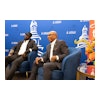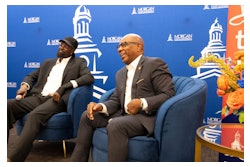The COVID-19 pandemic has made it unsafe for large groups of students to gather for in-person assessments. A logical and humane response is many colleges and universities are announcing SAT and ACT optional policies for the 2021 application cycle. For decades, American colleges and universities have relied on these exams for evaluating and contextualizing international students versus their domestic peers while disproportionately burdening international students. We now have an opportunity to take a step back and consider how, instead, admissions offices can fairly and equitably evaluate and enroll students from abroad—especially non-native English speakers.
 Jennifer Dewar
Jennifer DewarAssessments like the SAT and ACT have long come under fire for increasing opportunity gaps rather than serving their purported purposes. Students from wealthier families in the U.S. can hire tutors to prepare and can afford to reside in school districts that correlate with higher test scores. And abroad, American international schools generally are located in or near capital cities and embassies, attracting local families with money who wish to send their children to selective colleges across the globe. This creates a divide mirroring that in the U.S.: bright students who live at a distance from a major city or whose families are less resourced are less likely to have access to standardized testing preparation and therefore higher education opportunities.
If traditional standardized tests are not an objective measure of academic potential, admissions officers must seek other measures. But beyond transcripts, recommendations, and essays, how can they consider a student from another country and evaluate whether they would be a good fit for a particular campus?
For international students specifically, instead of relying on the SAT or ACT, admissions officers should be trained to assess the national graduation measures in students’ home countries. The U.S. is one of the few countries in the world that does not require students to take a test after secondary school for entry into university. This test optional movement is an overdue step away from imposing American standards on international students—a move not imposed by other countries. For example, the United Kingdom does not require international applicants to sit for A-Levels. High-quality international universities set entry benchmarks just as high as American institutions. If a Chinese student achieves exceptional scores on the Gaokao or a German student aces the Abitur, they are demonstrating academic strengths that suggest they can handle demanding American higher education.
Another potential solution is using videos in the admissions process. While admissions officers rely on transcripts and letters of recommendation to signal academic preparation, short videos can convey intangible qualities of students and provide a feel for their personality. Especially as in-person interviews slow down due to travel and public safety concerns with COVID-19, all students can benefit from showing what they offer “off-paper.” To use this measure effectively, admissions office staff need to be trained to evaluate student videos as objectively as they do GPAs and essays.
Additionally, admissions offices need to know if international students can function—in English—at their institutions , and whether they can effectively communicate with their instructors and peers in and outside the classroom. Technology enables schools to assess applicants’ English levels, especially given that traditional English tests have created the same limitations and barriers as other admissions testing. Digital-first online, adaptive proficiency exams such as the Duolingo English Test are vital in a test-optional world because they serve as an objective measure. Instead of measuring what can be conflated with wealth and access to resources, digital-first English proficiency tests provide a score that gauges whether a student could successfully communicate on a college campus.
COVID-19 has forced colleges and universities to revisit long-standing policies and practices. Perhaps one silver lining is this crisis has brought forth a reckoning where innovation can improve students’ experiences. We should be open minded, flexible, and nimble when evaluating students from around the globe and providing solutions for accessing U.S.-based higher education. While the pandemic has caused significant disruption in higher education, we have the opportunity to positively disrupt the way we evaluate international students, and normalize student-centric admissions practices.
Jennifer Dewar is the head of strategic engagement for the Duolingo English Test. She has 17 years working in admissions at highly-selective universities, including Duke University and Washington University in St. Louis.


















